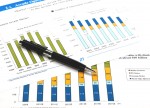
- All Instrument Types
- Indices
- Equities
- ETFs
- Funds
- Commodities
- Currencies
- Crypto
- Bonds
- Certificates
Please try another search

Quebec Economy On Track To Having Its Best Year Since 2004

Last Friday, the Quebec government released its Monthly Report on Financial Transactions. The report showed a slightly better-than-expected fiscal performance versus 2017 budget expectations for the first quarter of FY 2017-18 (April to June). Indeed, after taking into account deposits to the Generations Fund, a small $98-million budgetary surplus was registered during the April-June period. The surplus looks particularly impressive in comparison to the $529-million deficit recorded during the first three months of FY 2016-17.
The Quebec economy is on track to have its best year since 2004, with annual real GDP growth slightly surpassing 2.5% in 2017. Thus, the increase in fiscal revenues for FY 2017-18 will surpass 2017 budget expectations. Year-to-date, own-source revenues rose by 4.4% (a change of 1 percentage point in nominal GDP has an impact of about $650 million on the government’s own-source revenue).
Before the Bank of Canada started to raise its policy rate and before the S&P credit agency upgraded the province of Quebec's long-term credit rating from A+ to AA- on June 15th, declining bond yields allowed the province to register a significant decline in the costs of servicing its debt; down 8.8% in the April-June period of FY 2017-18 versus a year ago (a greater-than-anticipated rise in interest rates of 1 percentage point over a full year would increase the interest expenditure by about $250 million).
Strict cost controls, one of the key factors cited by S&P for the credit rating upgrade awarded to the province, remain intact: program spending rose only 1.7% year-to-date, well below 2017 budget expectations of 4.1%. However, in our view, program spending in the coming months could increase at a faster pace because of the expenses related to the provincial government’s flood relief plan and the assistance provided to finance the stronger-than-expected influx of refugees. Thus, for the remaining three quarters of FY 2017-18, it would be hasty to confidently conclude that Quebec is going to generate further surpluses.
Furthermore, as we mentioned in our 2017 budget write-up last spring, there is still a lot of uncertainty surrounding U.S. trade and fiscal policies and their potential impacts on the Quebec economy. Also, the 2017 Quebec budget released at the end of March did not include the recent surge in interest rates across the Canadian yield curve and the substantial appreciation of the Canadian dollar. Those are expected to put downward pressure on the Quebec economic outlook, increasing the economic case for tax cuts in the 2018 budget; besides the fact that the 2018 elections are most likely to be held in the fall of next year. During his press conference related to the Monthly Report on Financial Transactions last Friday, Finance Minister Carlos Leitao said that he intends to reduce the tax burden of SMEs and individuals next year. Given the minister’s comment, market participants should not expect the Quebec government to put extra efforts on debt reduction beyond what is already projected to be dedicated to the Generations Fund (a $2.5-billion transfer in FY 2017-18). In fact, there is a possibility that the Quebec government will use the $2.4-billion amount currently held in the stabilization reserve to finance tax cuts in its 2018 budget.
Related Articles

In this episode, I look at the latest U.S. inflation report, which shows a slight increase to 3% in January—higher than expected. Rising energy, transportation, and shelter...

Gold hits record highs, creating exciting opportunities for your portfolio! In this video, we dive into today's market highlights, offering invaluable technical analysis of...

US equity futures are slightly higher. European markets opened firmer and Asian equities ended mixed. Markets continue to digest the hotter-than-expected US January CPI report,...
Are you sure you want to block %USER_NAME%?
By doing so, you and %USER_NAME% will not be able to see any of each other's Investing.com's posts.
%USER_NAME% was successfully added to your Block List
Since you’ve just unblocked this person, you must wait 48 hours before renewing the block.
I feel that this comment is:
Thank You!
Your report has been sent to our moderators for review





Add a Comment
We encourage you to use comments to engage with users, share your perspective and ask questions of authors and each other. However, in order to maintain the high level of discourse we’ve all come to value and expect, please keep the following criteria in mind:
Perpetrators of spam or abuse will be deleted from the site and prohibited from future registration at Investing.com’s discretion.